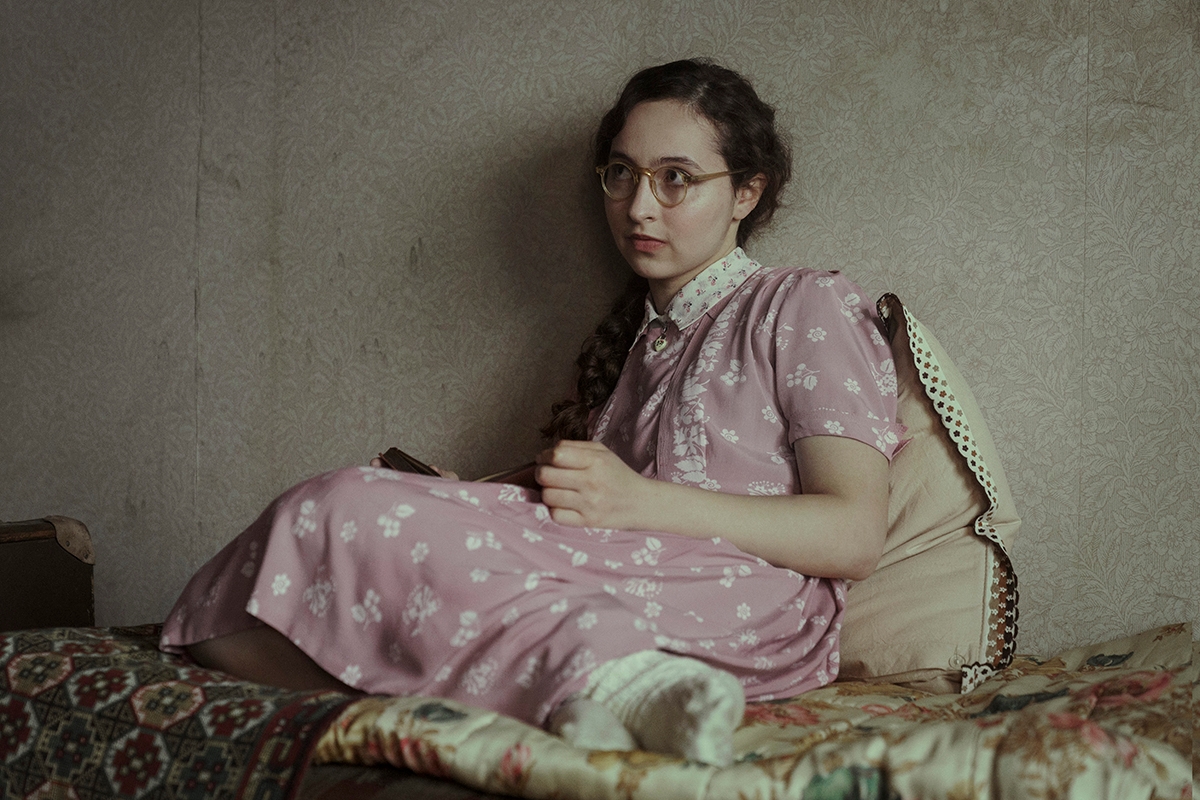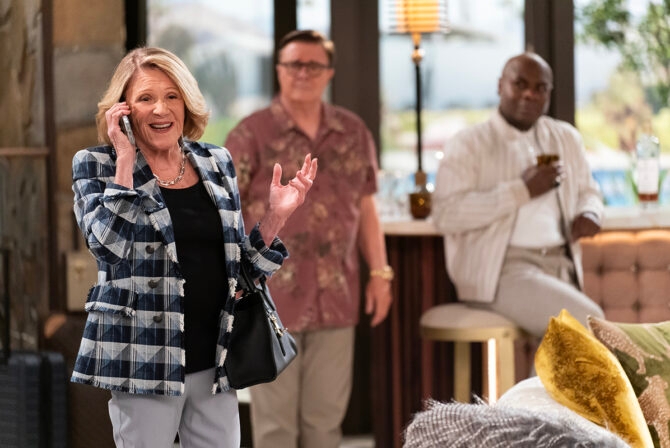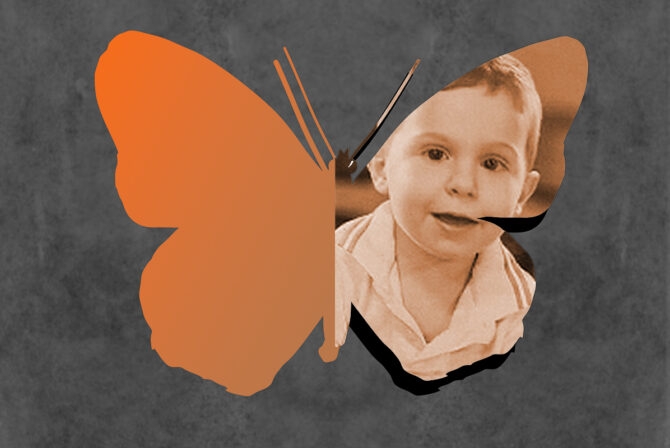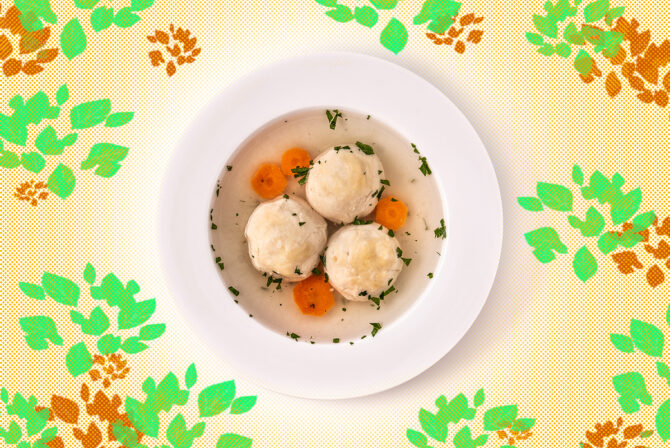Did you know that Margot Frank also kept a diary? The tome is mentioned in Anne’s diary, and yet, unlike the bestselling words of her younger sister, Margot’s recollections of her life in the secret annex were never recovered. Like the stories of so many murdered in Holocaust, hers has been lost.
In “A Small Light,” the show about Miep Gies, the secretary who helped salvage that famous diary and hide the Frank family during the Holocaust, now available to stream on Hulu and Disney+, we get to meet Margot. She’s played by Ashley Brooke, a gifted young Jewish actress from New Jersey who herself is the granddaughter of a Holocaust survivor.
The first episode opens with a scene in which Miep Gies (Bel Powley) helps Margot bike over to the annex, crossing a Nazi checkpoint on the way. Margot, at 16, doesn’t think that she can do it — she’s perplexed when Miep asks her to drop her coat, with her yellow star, on the ground; she is worried about not having her ID. Her eyes are brimming with tears of terror and frustration as she laments not being as brave and knowledgable as her sister. “She knows who she is. She’s only 13 and she wants to be a famous writer, and I’m 16 and I don’t have any idea who I want to be.”
I related to Brooke’s Margot so much — her fear, her vulnerability, the way she’s absolutely overwhelmed by living through the horrors of Nazi persecution. Anne Frank, played in this series by Billie Boulet, may be extraordinary — but Margot is so many of us as teens, tender and insecure, longing to make sense of a particularly nonsensical world.
Kveller spoke to Brooke, 18, about what it meant to her to bring this character, always reserved to the sideline of Anne’s story, to life.
This interview has been edited and condensed for clarity.
What was it like for you to flesh out Margot’s character, and what was it about her that you connected with?
It was a bit difficult in the beginning to find so much on Margot. I think we all know a lot about about Anne, because we have firsthand accounts. Margot’s diary, which she did have, was never published, because it was never found. I always tried to think, from other people’s perspectives, what would really have been in Margot’s diary. I also tried finding as many firsthand accounts that I could find. There were these letters between Anne and Margot that really informed [me] about who Margot was — how she felt like she didn’t really have anyone to talk to. Especially in the beginning, I think that she fell into a bit of a depression. She was a bit of a rule follower, and they were breaking the law and going into hiding.
I just fell in love with Margot and her quirks and how she was so different than Anne.
Were there any scenes that you found particularly hard or particularly moving to do?
I would say the first scenes of our pilot episode were pretty difficult. There’s a really big weight to them, because they set the tone for the story. I remember it was my first day of filming, actually, when we shot the checkpoint scenes where they’re trying to pass a checkpoint, Margot and Miep, and tapping into the enormity of that.
We also filmed right in front of the Anne Frank apartment, and that was really emotional for everyone. I remember us taking a moment to look around. We were talking about how Anne and Margot would be biking on this street, and playing around in the park nearby. It was definitely an emotional day for all of us. It just felt so special — being there, and being able to honor them.
Did you read Anne Frank’s diary before being cast on the show?
I did. I read it when I was very young. I think a lot of the details in it started to slip my mind as I was getting older. As time passes on, you start to forget certain things, which I think is why it’s so important that we keep having stories like these being told, because you need to keep being reminded.
Anne is a source of hope for so many people around the world. She’s so intelligent in the way she speaks about everything. It’s really inspiring the way that she was writing about everything with such depth and light and hope, even in this dark period. It was really inspiring to reread it because I think I caught a completely different perspective on everything that was going on in the world that they had to create for themselves while they were together for so long.
As a Jewish actress, what does it mean for you to play this role?
It’s so special, especially because my grandma is a Holocaust survivor. This story is about being proud of your religion. The Frank family were still celebrating Jewish holidays in a time when your religion was completely not accepted. I took a lot from their resilience and how they were so proud of their religion, even when they were only defined by their religion. I honestly learned a lot about myself, and my background, from this project.
I was able to even watch my own grandma’s testimony when I got this role, which was really special. I remember her talking about the moments of fear, but also how she was never a negative person. She really described those moments of hope that allowed her to survive, the people that allowed her to survive. There was one person who told her to go one way and say that you’re 18 so that she wouldn’t go in a separate line where she would be killed. There was a soldier who was nice to her and gave her boots while she was going from one camp to the other. It was moments like those that brought me back to what Miep was for the Frank family.
Did you grow up hearing your grandmother’s story?
She lived to the age of 96. She passed away about two years ago, but when I was [old enough to be] able to hear the story, she had Alzheimer’s, so I was never actually able to hear it from her. What was really amazing about coming onto this project was that my family told me that there was a video of her story from the USC Shoah Foundation, where she described her whole experience with the Holocaust and how it affected her. Watching that video, I was so touched, because I didn’t know everything that she went through. It just made me even more proud of where I came from and and how resilient she was.
She grew up in Czechoslovakia, and when the war was over, she was taken to the States. She never really talked about her experience, because they didn’t want people really talking about the war during that time. So she kept it to herself for a really long time.
I do remember my cousin telling me about this one moment where she was talking about how she had to wear a yellow Jewish star, but even through all of that, she was still wearing her best clothes as if she wasn’t wearing the star. That just reminded me a bit of [Anne’s] feistiness. My grandma also was in the Bergen Belsen work camp, so I mean, it’s possible that Anne and Margot were also around [at the same time.] She was around Margot’s age.
Can you tell me a little bit about what being Jewish means to you now?
For me, being Jewish is more than just religion. It’s a culture. I was bat mitzvahed, I did go to temple when I was growing up, but the moments that I remember the most are my grandma making the best matzah ball soup from scratch, and my family getting together for Passover. I’m also just so proud to to be Jewish, especially through this project. It just connected me so much more to my roots and my background.
Do you have a favorite Jewish holiday?
My family gets together for Passover, so I would say that. I think it’s just getting to see my family whenever it is, honestly it doesn’t have to be a specific holiday. It’s just getting together and celebrating together. Those are the moments that I remember the most and will always cherish the most.
Where did you grow up in?
New Jersey.
Where I am calling you from!
Is that where you’re from, too?
Well, I’m from Israel, actually. But I live in New Jersey now.
Oh, wow. Israel is absolutely beautiful. I am excited to [go on Birthright]. I’ve been there already, too; I have so many highlights of going to Israel.
What were your favorite things?
We went to celebrate my brother’s bar mitzvah. My parents set us up to go on a tour with other families. It was special because we all bonded and everyone was so sweet and kind. There were kids of all ages. My highlight is probably the Dead Sea.
What did you do for your bat mitzvah?
I had a ceremony and then I had a party.I had this blue dress that also kind of matched the theme of the party, which was, I believe, teal, blue and silver.
That’s so classy!
It was so much fun. We had a DJ playing all these throwback songs, and there was a stage and my friends were just getting up to sing. We had a good, good time.
Any other highlights from working on “A Small Light?”
The bonds that we’ve created on set were amazing. It was my first time going to Europe; there’s so much history there that I don’t think I would have wrapped my mind around had I not gone to Europe to film there. It was a really special group of people. The cast, the crew, the creative team. They’re all just really kind and down to earth people; it means filming this was just so much more special, because you don’t always get that.
Did it feel important to have such a Jewish cast?
It was great, because we all knew the depths of telling the story and doing it justice. We all felt that this was a really special project. I think that just made it all the better.
What was it like to work with Liev Schreiber, who plays Otto Frank?
He is amazing to work with. When he speaks, everyone listens — it’s that soothing baritone voice. I just love the way that he took on Otto. I have learned so much from him as an actress just watching him. He’s a director himself, and he has a director’s mindset. I could really tell that by the way he was planning out everything that would go on in the scene. I will definitely be taking everything I learned from him and from Bel, and from all of the amazing people that were on this show, to next projects.
Is there anything else you’d like people to know about “A Small Light?”
I think what’s so special about “A Small Light” is that it shows the moments of light and humor, even though this is such a serious and traumatic moment. We get through the toughest times through the lightness and happiness and comedy. That’s exactly what “A Small Light” does. My hope is that people don’t shy away from it just because it’s a story about the Holocaust. They’ll think, it’s gonna just be sad and gloomy the whole time. I think there’s something so special about this in that it shows the light and the hope and the humanity of it all.








